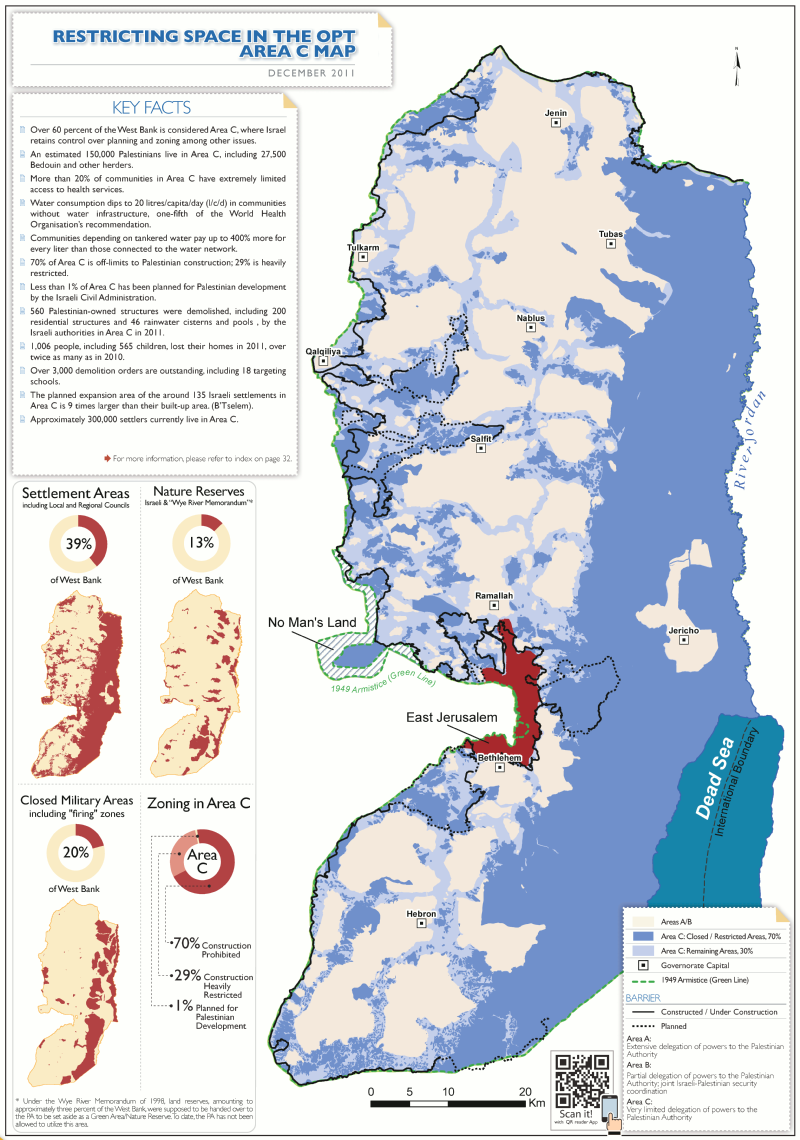Originally published by Ma’an News Agency on October 8, 2013.
BETHLEHEM (Ma’an) — Israel’s control over the largest part of the occupied West Bank deprives the Palestinian economy of an estimated $3.4 billion a year, the World Bank reported Tuesday. This lost potential income is equivalent to some 35 percent of the Palestinian gross domestic product in 2011, according to a new World Bank report, “Area C and the Future of the Palestinian Economy.”
The report, released Tuesday, is the first comprehensive study of the potential impact of the occupation on economic production in Area C. It blames the Israeli military’s exclusive control over the territory for undermining the Palestinian economy and contributing to wide-ranging unemployment.
“Since Area C is where the majority of the West Bank’s natural resources lie, the impact of these restrictions on the Palestinian economy has been considerable,” the report concludes, and “the key to Palestinian prosperity continues to lie in the removal of these restrictions with due regard for Israel’s security.
“The report also estimates that if Area C were to be returned to Palestinian control, government revenues would increase by $800 million, cutting the Palestinian Authority’s fiscal deficit in half and reducing its crippling reliance on international aid.
“Rolling back the restrictions would bring substantial benefits to the Palestinian economy and could usher in a new period of increasing Palestinian GDP and substantially improved prospects for sustained growth,” the report concludes.
Area C makes up about 61 percent of the occupied West Bank. Under the terms of the 1993 Oslo Accords between Israel and the PLO, it is under full Israeli military control.
The territory comprises the only contiguous piece of land connecting 227 Palestinian residential communities in areas A and B as well as about 150,000 Palestinian residents. Area A contains about 11 percent of the territory and is theoretically under full Palestinian control while Area B, which contains about 28 percent, is administered jointly by Israel and the PA.

‘Deliberately conservative’ estimates
To reach the $3.4 billion figure, the World Bank report’s authors said they had to make “deliberately conservative assumptions” about the effects of Israeli restrictions on Area C. They predicted the benefits of lifting movement and access restrictions as well as other obstacles to investment and economic activity in Area C.
They also examined potential growth sectors like agriculture, Dead Sea minerals, mining and quarrying, construction, tourism, telecommunications and cosmetics.
Taken together, “the potential additional output from the sectors evaluated in this report alone would amount to at least $2.2 billion annually in valued added terms – a sum equivalent to 23 percent of 2011 Palestinian GDP. The bulk of this would come from agriculture and Dead Sea minerals exploitation.
“The effects would also be felt in reductions of unemployment and poverty rates for Palestinians across the West Bank, as the “spillover” effects of increased Palestinian access to Area C would include stronger infrastructural links in all regions and cities.
Today, these links are impeded by restrictions on movement which take the form of the separation wall, fixed checkpoints, flying checkpoints, Israeli-only roads and other physical impediments to movement.
The report estimates that with the spillover effects included, “the total potential value added from alleviating today’s restrictions … is likely to amount to some USD 3.4 billion, or 35 percent of Palestinian GDP in 2011.
“Israel permits Palestinians to build on less than 1 percent of Area C land, and permit data suggests it almost never officially gives Palestinians permission to build, according to United Nations figures.Under the Oslo Accords, Area C was to be gradually transferred to Palestinian control within five years.
But Israel has refused to withdraw its forces from the territory, citing security concerns and the absence of a final peace agreement. The internationally recognized Palestinian territories of which the West Bank forms a part have been occupied by the Israeli military since 1967.
